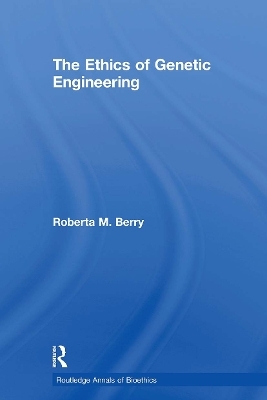
The Ethics of Genetic Engineering
Seiten
2010
Routledge (Verlag)
978-0-415-88791-5 (ISBN)
Routledge (Verlag)
978-0-415-88791-5 (ISBN)
This book examines the implications of each of the prominent normatic theories which have surfaced in relation to genetic engineering.
Human genetic engineering may soon be possible. The gathering debate about this prospect already threatens to become mired in irresolvable disagreement. After surveying the scientific and technological developments that have brought us to this pass, The Ethics of Genetic Engineering focuses on the ethical and policy debate, noting the deep divide that separates proponents and opponents. The book locates the source of this divide in differing framing assumptions: reductionist pluralist on one side, holist communitarian on the other. The book argues that we must bridge this divide, drawing on the resources from both encampments, if we are to understand and cope with the distinctive problems posed by genetic engineering. These problems, termed "fractious problems," are novel, complex, ethically fraught, unavoidably of public concern, and unavoidably divisive. Berry examines three prominent ethical and political theories – utilitarianism, Kantianism, and virtue ethics – to consider their competency in bridging the divide and addressing these fractious problems.
The book concludes that virtue ethics can best guide parental decision making and that a new policymaking approach sketched here, a "navigational approach," can best guide policymaking. These approaches enable us to gain a rich understanding of the problems posed and to craft resolutions adequate to their challenges.
Human genetic engineering may soon be possible. The gathering debate about this prospect already threatens to become mired in irresolvable disagreement. After surveying the scientific and technological developments that have brought us to this pass, The Ethics of Genetic Engineering focuses on the ethical and policy debate, noting the deep divide that separates proponents and opponents. The book locates the source of this divide in differing framing assumptions: reductionist pluralist on one side, holist communitarian on the other. The book argues that we must bridge this divide, drawing on the resources from both encampments, if we are to understand and cope with the distinctive problems posed by genetic engineering. These problems, termed "fractious problems," are novel, complex, ethically fraught, unavoidably of public concern, and unavoidably divisive. Berry examines three prominent ethical and political theories – utilitarianism, Kantianism, and virtue ethics – to consider their competency in bridging the divide and addressing these fractious problems.
The book concludes that virtue ethics can best guide parental decision making and that a new policymaking approach sketched here, a "navigational approach," can best guide policymaking. These approaches enable us to gain a rich understanding of the problems posed and to craft resolutions adequate to their challenges.
Roberta M. Berry is Associate Professor of Public Policy and Director of the Law, Science and Technology Program at Georgia Institute of Techology, USA.
Preface
CHAPTER 1: GENETIC ENGINEERING: PAST AND PRESENT
AS PRELUDE TO THE FUTURE
CHAPTER 2: UTILITARIANISM AND ENGINEERING TO MAXIMIZE
WELFARE
CHAPTER 3: DEONTOLOGY: ENGINEERING AT THE EDGES OF
DISEASE, DISABILITY, DIFFERENCE, AND DEATH
CHAPTER 4: VIRTUE ETHICS AND ENGINEERING
FOR THE VIRTUES
CHAPTER 5: GENETIC ENGINEERING, FRACTIOUS PROBLEMS, AND
A NAVIGATIONAL APPROACH TO POLICYMAKING
Notes
Bibliography
Index
| Erscheint lt. Verlag | 11.11.2010 |
|---|---|
| Reihe/Serie | Routledge Annals of Bioethics |
| Verlagsort | London |
| Sprache | englisch |
| Maße | 152 x 229 mm |
| Gewicht | 440 g |
| Themenwelt | Geisteswissenschaften ► Philosophie ► Ethik |
| Medizin / Pharmazie ► Medizinische Fachgebiete ► Medizinethik | |
| Studium ► Querschnittsbereiche ► Geschichte / Ethik der Medizin | |
| Sozialwissenschaften ► Politik / Verwaltung ► Staat / Verwaltung | |
| Sozialwissenschaften ► Soziologie | |
| Technik ► Umwelttechnik / Biotechnologie | |
| ISBN-10 | 0-415-88791-7 / 0415887917 |
| ISBN-13 | 978-0-415-88791-5 / 9780415887915 |
| Zustand | Neuware |
| Haben Sie eine Frage zum Produkt? |
Mehr entdecken
aus dem Bereich
aus dem Bereich
Die Geschichte eines Weltzentrums der Medizin von 1710 bis zur …
Buch | Softcover (2021)
Lehmanns Media (Verlag)
CHF 27,90
Krankheitslehren, Irrwege, Behandlungsformen
Buch | Softcover (2024)
C.H.Beck (Verlag)
CHF 55,90


